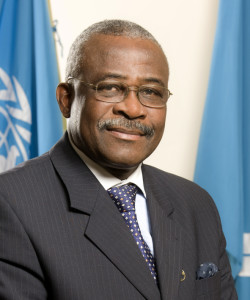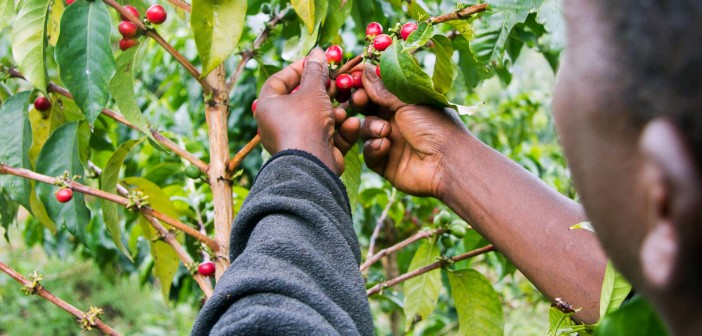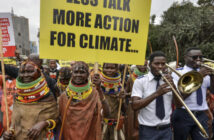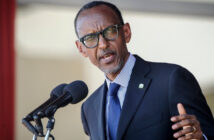 How many Africans or indeed Nigerians are at the helms of international organizations? The answer is a very minute few. Dr. Kanayo F. Nwanze is a Nigerian and the helmsman at IFAD, the International Fund for Agricultural Development. This global agency is responsible for ensuring poor rural people are systematically drawn out of poverty. Speaking in his office in Rome recently with Akinola Akingbala, the deputy editor of African Ripples Magazine, he touched on several aspects of operations of the agency and his plans for the future. This is a must read for all Nigerians about a Nigerian doing exceptionally well on the international scene.
How many Africans or indeed Nigerians are at the helms of international organizations? The answer is a very minute few. Dr. Kanayo F. Nwanze is a Nigerian and the helmsman at IFAD, the International Fund for Agricultural Development. This global agency is responsible for ensuring poor rural people are systematically drawn out of poverty. Speaking in his office in Rome recently with Akinola Akingbala, the deputy editor of African Ripples Magazine, he touched on several aspects of operations of the agency and his plans for the future. This is a must read for all Nigerians about a Nigerian doing exceptionally well on the international scene.
What are the strategic measures that IFAD is championing to ensure food security in poor countries especially in Africa?
In most regions of the world, the vast majority of the food that is consumed is produced locally. Therefore the question of how different parts of the world can feed themselves is likely to remain primarily a question of how to strengthen the local, national and regional food production capacity. In many regions of the world, including Africa, the experience of the International Fund for Agricultural Development (IFAD) shows that smallholder farmers are key actors in food production. The task at hand is therefore to strengthen smallholder production systems and the capacity of small farmers.
Today, there are unprecedented opportunities in African agriculture. Africa is one of the world’s fastest-growing economic regions, and its growth in agricultural GDP is strong. Growth was 4.8 per cent in 2009, compared with 3.8 per cent for Asia Pacific region and 1.4 per cent growth in Latin America and the Caribbean. The middle class is growing across the continent, driving demand for food. Africa also has the largest share of the world’s uncultivated land with rainfed crop potential, so there is room for agriculture to expand, and to do so sustainably. In addition, Africa has the greatest potential to reduce poverty through smallholder agriculture. Small farms, of 2 hectares or less, represent 80 per cent of all farms in sub-Saharan Africa. They contribute up to 90 per cent of production in some countries.
These small farms have the potential to be key suppliers to Africa’s growing urban and rural markets. As the multinationals have noticed, the outlook for African food markets is bright. The demand exists and is growing. This means new and exciting possibilities for the agro-industrial sector. But is the African agricultural sector ready to take advantage of these opportunities? It can be if improvements are made now.
What is genetically modified food? The dangers and benefits to human race?
Genetically modified foods are foods derived from genetically modified organisms (GMOs). Genetically engineered plants are typically generated in a laboratory, and their genetic makeup is modified so as to include/enhance desired traits – such as increased resistance to herbicides or improved nutritional content. The enhancement of desired traits has traditionally been undertaken through breeding, which can be very time consuming and not always very accurate. The major advantage of genetic engineering is that we can create plants with the desired trait very rapidly and with great accuracy. In addition, it allows selected individual genes to be transferred from one organism into another, also between non-related species – which would not be possible via conventional breeding.
But the fact is that the focus of GMO crops is often on improving traits that are of limited relevance to poor smallholder farmers in developing countries – for instance, herbicide resistance. This is largely because most GMO development has been focused on larger commercial farms that provide the best market for such products.
In Africa, priorities to meet food security needs would involve focusing on staple food crops of smallholder farmers, such as sorghum, cassava, and banana, with a view to increasing yields and reduce risks of crop failure from drought, pests and diseases. They would also include increasing production of more nutritious food crops, which are currently grossly neglected.
The challenge, however, is in striking the right balance. Indeed, agricultural biotechnologies, including genetically modified crops, can provide us with more resilient, more nutritious crops. Biotech can help in shortening our delivery and results time and in fine-tuning the products of research more efficiently in support of smallholder farming.
But they are not a silver bullet. As responsible scientists, we must approach biotechnologies from an angle that looks at both the agricultural and eco-systems that they operate under, as well as the people, including the poor rural farmers, which they stand to benefit.
Subsistent family agriculture which has helped to sustain and feed human existence is greatly on the decline, what IFAD is doing to redress it?
Let me point to the fact that there is no decrease in yield. The problem is decrease in the rate of growth of the yield. But food insecurity is not just about insufficient food production. It is about reducing losses and wastes and about strengthening the capacity of poor people to afford the food they need. At the same time, the need to improve productivity in marginal environments is indeed taking on a new urgency, in Africa and beyond. IFAD is contributing to a research and development agenda that aims to strengthen the productivity, sustainability and resilience of smallholder agriculture in developing countries in particular in Africa.
In our efforts to improving the food security of poor rural people in developing countries, IFAD focuses on financing projects managed and implemented by research institutes that are centres of excellence with regard to agricultural research for development. The focus is on crops that are of relevance to IFAD’s target group, for income generation and for food security. We promote forward looking technologies that can help poor rural people adapt to climate change, we look at nutrition (quality of food) and not only at improving yield (quantity of food produced). And we make sure that technologies introduced are culturally and socially acceptable to the countries where these are being implemented and that these technologies benefit poor rural people.
An example of an IFAD-funded grant related to improving poor rural people’s food security is the Bioversity International managed programme. The goal of this programme is that 10 per cent of the families in 31 indigenous communities have a more stable food supply of project crops and that diversity-rich practices substitute chemical pesticide use in these communities. This is accomplished by supporting farmers in their access and use of diverse varieties of major food security crops to reduce crop loss from pest and disease damage.
The programme was developed at the request of national partners (in Uganda, Morocco, Ecuador and China), as a result of the fact that pests and diseases were causing a substantial loss to their annual harvest. This IFAD-funded programme is enabling resource-poor farmers to have increased number of different local crop varieties with different resistances, and are therefore more resilient to changes in pest and disease infestations, giving rural farmers increased adaptive capacity in their local production systems to buffer against unpredictable environmental change. This will not only reduce current crop loss and maintain yield stability, but also reduce the risk of genetic vulnerability.
This programme is particularly relevant to IFAD’s target group because we are promoting the use of resources (local biodiversity) that poor smallholder farmers already have, and are enabling them to manage these resources in order to reduce the losses caused by pests and diseases – without using GMOs or excessive amounts of chemical pesticides.
Climate change has been acknowledged as a clear and present danger, what is IFAD doing to promote a greener world?
Today, few people question the reality of climate change. We are already faced with more frequent floods, more frequent droughts and flash floods, more extreme temperatures, reduced average rainfall, increasing desertification and declining soil fertility.
Yet even under these conditions, even in the most marginal and ecologically fragile areas of the world, we can achieve remarkable results. At IFAD, we see time and time again, in Africa, the Americas and Asia, the transformation that occurs when development is economically, environmentally and socially sustainable, when it is centred on smallholders, and when local people are involved from the start.
For example, in Egypt, more than 1.3 million households have benefited from IFAD-supported programmes. Together we have helped reclaim around 188,000 hectares of productive land and supported the establishment of 570 water users’ organizations, thereby reducing irrigation costs by 25 per cent and leading to dramatic improvements in water savings.
Adaptation to climate change in agriculture is one key priority that IFAD is addressing in its work. IFAD’s Adaptation for Smallholder Agriculture Programme (ASAP), is a fully-integrated programme to channel climate finance directly to smallholder farmers. There are various levels of climate finance out there, but ASAP focuses solely on smallholder farmers, an important part of the solution that is often overlooked.
The threat of bio-fuel to food production, what IFAD is doing to balance food production and bio-fuel?
As an organization with a people-centred development approach IFAD’s interest in bio-energy is mainly in the context of rural development and poverty reduction. Whatever IFAD supports must be clearly pro-poor, pro-environment and pro-livelihoods.
Due to high oil prices in 2008 and prospects of depletion of fossil fuel resources, over the past few years, there has been a rapid increase in demand for land in developing countries, including for bio-fuel production.
This trend is leading to more pressure and competition over scarce and deteriorating natural resources and is inducing land-use changes that could be detrimental to local food security, biodiversity and environments.
There is the need, and we believe there are real possibilities to minimize risks and maximize opportunities to enable poor rural people participate in and take advantage of bio-fuels development without compromising their food security and land rights.
IFAD has been identifying and supporting policy options, risk mitigation strategies and alternative business models for pro-poor bio-fuel production that focus on certain crops; taking into consideration food security, land and environmental issues; and involving the private sector and research institutions as key partners.
Example of success story in biofuel development in Mali
Mali Biocarburant SA – a company partly financed by the Netherlands – is producing bio-diesel from Jatropha Curcas without acquiring land and developing plantations for the national market. Small farmers are shareholders in the company. They supply the Jatropha nuts to the Union Locale des Sociétés Coopératives des Producteurs de Pourghere à Koulikoro (ULSPP), a farmer association which extracts the oil and sells it to Mali Biocarburant. The seed cake is sold to the farmers to improve soil fertility. Mali Biocarburant then processes the oil into bio-diesel and sell the by-product (glycerol) to a women’s cooperative to produce soap. The private company “Interagro” purchases the fuel and then distributes it. Farmers not only earn revenue through the sale of the nuts, but also through dividends and increased share value.
What is the effect of climate change on agriculture?
Today, with the increasing effects of climate change, our natural resources, such as land and water, are more precious than ever. There is a perceived trade-off between water for agriculture and food security, and water for other purposes. After all, about 70 per cent of the fresh water consumed in the world goes to agriculture. But the truth of the matter is, we simply do not have a choice. We must never forget that without security of our natural resources, including water, there is no food security.
The real issue is how we manage the available resources. In this regard, it is critical that the international community including multilateral organizations like IFAD invest in global public goods in the areas of research, technology development and institutional change. With a growing global population, it is clear that we must increase food production, make food systems vastly more efficient and reduce waste – all of this while conserving our natural resources.
What is IFAD doing to minimize the impact of the recession in Europe and slow growth in the US economy on global food production?
IFAD’s operations are in developing countries in Africa, Asia, Latin America and Caribbean and Near East where attention is paid to innovative participatory approaches that strengthen and empower communities to take charge of their own development so they too are not impacted by the global recession. In an interconnected world, what happens to one member of the international community will inevitably affect all.
Activities of IFAD and to a large extent its projects are in obscurity, can you tell us some of your landmark projects in Africa?
The reason why it would appear that IFAD is in obscurity is that we work where others do not – in the most remote and marginal areas of the developing world. Moreover, long-term development that is sustainable takes time. And although the news cameras and newspaper headlines are quick to show tragedy, conflict and famine, it is not easy to capture – and it is not as headline grabbing – to show the type of success stories in rural areas that IFAD is involved with.
Sub-Saharan Africa accounts for the single biggest tranche of IFAD’s on-going programmes and projects; about 45 per cent of new financing is being directed to the region.
In Africa, IFAD supports projects that are environmentally, socially and economically sustainable. IFAD also funds investment in local infrastructure, to provide small-scale irrigation and water control schemes, as well as communications and rural roads. The aim is to strengthen each link in the value chain.
Recently, IFAD provided a US$17.28 million grant to the State of Eritrea to support the National Agriculture Project. The new IFAD-supported project will contribute to improve household food security and alleviate poverty in rural areas of 34 districts of the country’s 6 provinces and in 3 agroecological zones. It also aims to increase smallholder agricultural production and productivity and reduce the country’s dependence on food imports through the intensification of irrigated and rainfed crop production, and the provision of fertilizer and improved seeds to the smallholder farmers. About 81,000 poor rural households, including 16,258 women headed households will directly benefit from the project. Households headed by women will be given priority in land allocation in new irrigated areas.
Another example is Nigeria. The new Value Chain Development Programme financing agreement of IFAD’s loan US$74.4 million was signed in August 2012 in Abuja. The Programme, which is in line with the government’s vision for agricultural development, will focus on supporting cassava and rice small farmers in the six states of Anambra, Benue, Ebonyi, Niger, Ogun and Taraba. It will strengthen farmer organizations by building their capacity to take advantage of existing market opportunities and overcome constraints along the value chain. The programme will also improve rural infrastructure such as roads and water facilities. More than 200,000 poor rural households will benefit directly from the programme, which will have a particular focus on women and young people. We have many success stories to tell in the African countries where we work.
What are the challenges IFAD is facing?
IFAD is focussed on the smallholder contribution to overall food security and its improvement through, inter alia, greater attention to linkages with market demand (particularly in and among developing countries themselves) – as well as on greater smallholder productivity and competitiveness. This is more so in the context of the food security problematique that has gone further than the food security of poor people alone.
In light of the global emphasis on economically sustainable responses to the global food security challenge, IFAD is focusing on strengthening the ability of smallholders in developing countries to expand and survive as profitable businesses.
Recognizing the shift away from the public sector as the main supplier of services bearing on smallholder productivity and income, IFAD is addressing factors facilitating private sector investment in the inputs, services and output management area – along with the organizational requirements among smallholders to establish equitable relations with the private sector.
Recognizing the limited resources of traditional donor countries for deployment through existing mechanisms , IFAD is focusing on raising the level of domestic investment in smallholder development programmes (very successfully), promoting private sector investment complementary to smallholder operations, and exploring alternative channels of mobilizing international investment resources.
Overall, the misfit between the importance of the global food security problem, on the one hand, and reduced or stagnant availability of donor resources, on the other, has impelled IFAD towards a scaling up agenda in which a broader partnership of national interests focuses on expanding the scope of proven solutions – based on more comprehensive policy dialogue, harmonization and a broader approach to financing.
If the international situation is just defined in terms of financial crisis, then one thing we have really been working on is increasing our value for money capacity (and how we can demonstrate it). This includes working on impact research, but also increasing efficiency, and focusing a lot more coherently on a scaling up agenda too. If the international situation is defined in terms of global food insecurity focus, we have been increasingly investing in understanding how smallholders can be enabled to be part of a solution to global food insecurity, and to facilitate them in this regard. Our work on public-private and private-private partnerships in agriculture and food value chains is a clear example of that.
How would you define the role of women in ensuring food security?
Women produce between 60 and 80 per cent of the food in most developing countries and are responsible for half of the world’s food production, yet their key role as food producers and providers, and their critical contribution to household food security, is only recently becoming recognised.
We know that enabling women to have more equal access to economic opportunities and services is not only a matter of justice — it is also one of the most effective strategies for reducing poverty and malnutrition. Women hold the key to ensuring food and nutrition security. The numbers are convincing: production on women’s farms could increase by 20 to 30 per cent if women had the same access as men to agricultural resources such as deeds to their land, credit and technical training. With access to these resources, women could reduce the number of hungry people in the world by 100 to 150 million people.
International initiatives and efforts, developed especially since the 1975 World Conference on Women in Mexico, have contributed to a greater recognition of women’s key participation in rural and other domains of development. However, much remains to be done.
Personalized questions.
What is your take on politics? And do you have political ambitions?
I am a scientist and a development expert and I have no political ambitions.
After IFAD, what is next for you?
I was elected President of IFAD in February 2009 and will complete my first term of office on 31 March 2013. The President of IFAD, under the direction of IFAD’s governing bodies, is responsible for managing the Fund and is the chairperson of its Executive Board, whose membership consists of representatives of IFAD Member States. On 13 February 2013, I was elected to serve a second four year term, so it is a bit early to think about what I will be doing after IFAD.
How do you describe a typical day in the office?
I would divide my office life in two parts. The days I am in Rome working at IFAD headquarters dealing with the day-to-day operations at IFAD. And the days when I am travelling and visiting our field projects. Both headquarters and the field can be considered my office. And there really is nothing more gratifying than working with such dedicated people – be it IFAD staff or the smallholder women and men that I have met throughout my travels in Africa, Asia and Latin America.




